Northern Warrior
By Brian Fox, Bass Player, August 2007, transcribed by pwrwindows
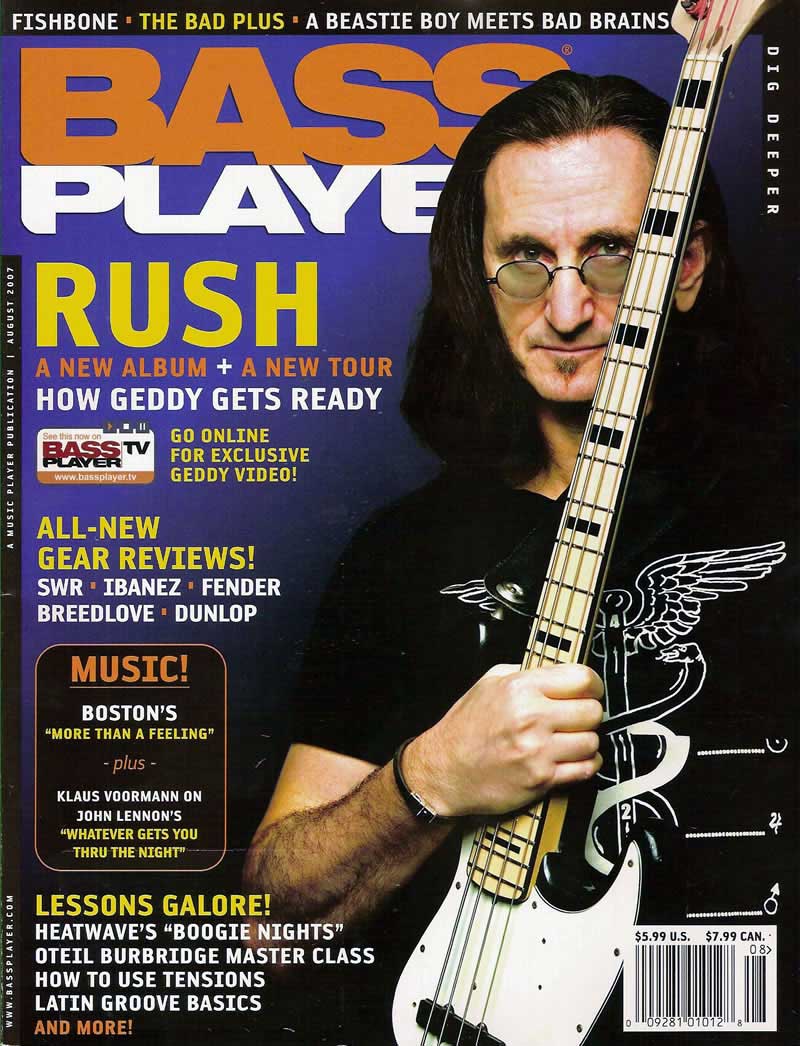
Since Rush's 1974 debut, the metallic clang of Geddy's bass has pierced the minds of millions, the blunt force of his melodic forays inflicting damage in arenas around the world. Recently, Geddy and his bandmates-guitarist Alex Lifeson and drummer Neil Peart-have had ample opportunity to batten down their live chops. Just a few years ago, the band staged an enormous world tour to mark its 30th anniversary and simultaneous release of the box-set retrospective R30 [Zoe, 2005]. Prior to that, Rush hit the road to perform classic rock anthems recorded for a 2004 EP of cover tunes, Feedback [Atlantic].
Truth be told, Rush fans are so rabid-and the trio possesses so much raw talent-that the band could easily get away with phoning in this round of live shows, trotting out greatest-hits sets for a huge payoff. But that's not Rush. The three players simply have too much respect for themselves and their fans, many of whom are fellow musicians. They've got some fresh material, and they're prepared to sell it note by note, town by town.
Released earlier this summer, Snakes & Arrows is the first new music from the band since 2002's Vapor Trails. On it, Rush sounds like a new group: The punch of Canada's pioneering power trio is stronger than ever, thanks in part to the input of producer Nick Raskulinecz, himself a Rush superfan.
Despite his obvious rehearsal fatigue, Geddy finishes his tea and rises to take on another of his band's rehearsal exercises. Brandishing his spruced-up '72 Jazz Bass-plus a pair of new Fender Jaco Pastorius Tribute Jazz Basses-Geddy takes his position at stage left and prepares to bash through a block of new tunes. Geddy's determined expression and deliberate moves speak volumes: The campaign's about to begin.
What is your rehearsal regimen like?
We rehearse from 12 pm to 5 pm every afternoon, five days a week, for about four weeks. Before that, we've each already had about three weeks of individual rehearsal so we know our parts-or we think we know our parts. We started by working at my home studio, and we'll end up renting out a small arena. Rehearsals are a lot of work, but we just have to power through them. It's music, music, music-working out our monitor cues, etc. Our soundman sets up in a different part of the building to mix the songs and get his act together. We start with the new material-we tackle one new song a day. There's quite a bit of technical choreography, triggering sounds and whatnot. The most difficult part of playing our songs is learning that choreography.
Neil triggers a lot of sounds with electronic drum pads. Now he's happy to call himself a drummer, a bass player, and a guitarist. In "Far Cry," there is one great big chord Neil triggers. I told him that every time he plays that part, he has to stick his arm in the air-if you're going to sound like a guitar player, you've got to look like one!
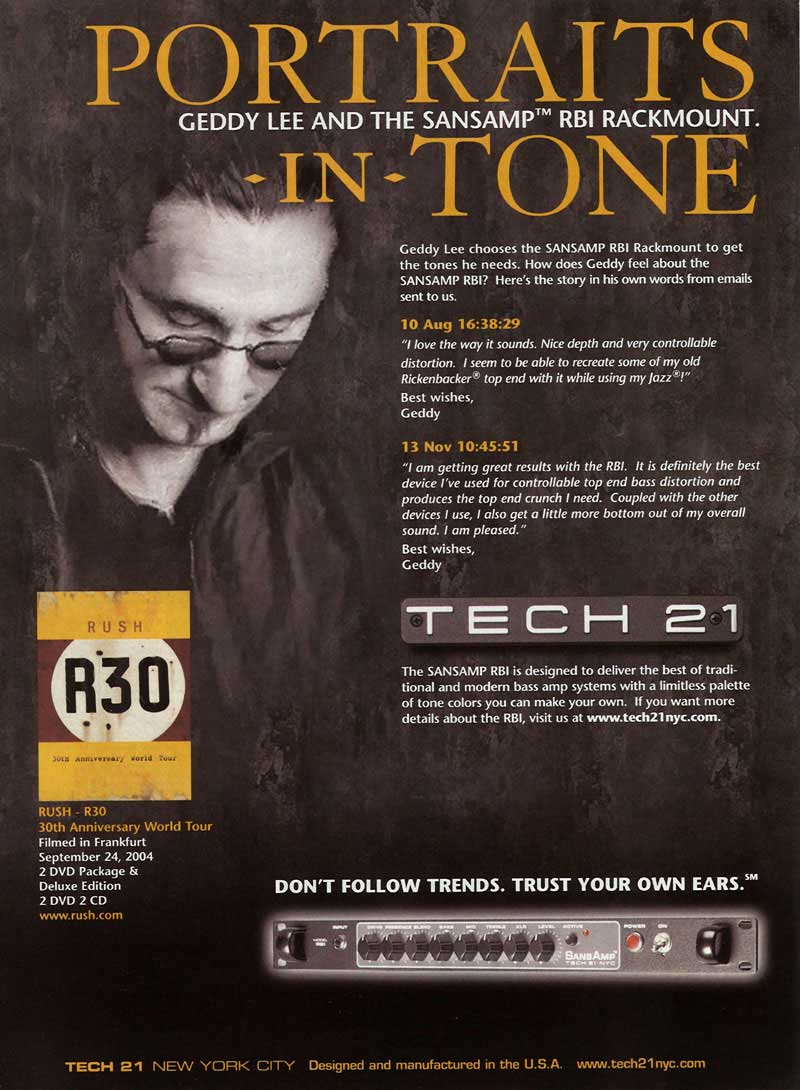
Having tracked bass and vocals independently, have you run into trouble performing both parts simultaneously onstage?
There's only been one song that's been a real struggle for me to separate bass and voice-"The Way the Wind Blows." The vocal is legato over a very active rhythm section, so I have to learn some independence. Always, the more bass rehearsal I have on a part, the more automatic it becomes. I have to focus most of my onstage energy toward vocal pitch and expression. The bass has to be subservient to the vocal; it's all subservient to what sounds best for my voice. We do lots of experimenting after we write a song. We'll listen to how I'm singing it and the key I'm singing in-if the key doesn't suit my voice, we'll change it. A song might begin in my comfort zone on bass, but not end up there. We never used to consider changing the key; that's why we ended up with so many songs in a high vocal register.
But our songs are all a challenge right now-some are quite demanding. The hardest thing is to capture the dynamic nuances. "The Way the Wind Blows" is a difficult song live because it goes from a real rocking verse part into what we call the anti-chorus-most choruses get louder, but sometimes ours get softer. That's a hard dynamic to work with a live three-piece band. A recording studio is better suited for that kind of delicate playing.
What are some of the lessons you've learned after playing so many live shows?
A clean bass sound sometimes doesn't knit in the mix with the guitar-if you listen to my bass on its own, it sounds really ratty and nasty. The right kind of distortion helps knit the overall sound together. Using distortion live is key for me. Also, I always want my bass louder in the mix. You bassists who think your bass isn't loud enough, you're right!
How did you go about writing this batch of new material?
Alex and I would get together about three days a week. We sat down and did a lot of talking about how to approach it. There was something about playing those old cover songs for the Feedback EP-and recording them without overdubs-that recalled the embryonic stage of our musicianship. I thought we should use that as a guide for where to begin this new project.
Alex and I used to write a lot while we were touring, using acoustic instruments in hotel rooms or the back of a station wagon. That's a great way to write for a couple of reasons. It's much more demanding to play an acoustic instrument, so Alex got his fingers in incredible shape in a very short period of time. Also, if you are writing on an acoustic guitar, it's clearer what works and what doesn't work-you can't be fooled by the technology. Sometimes the sexiness of the sound can trick you into believing a part is great, when you're really just working with a cool sound.
How does that relate to bass?
Bass is pretty naked all the time, though you can fuzz it out with effects. For me the bass is mostly a device to come up with patterns and harmonies to support the vocal melody. When we were writing, I'd play a lot of chords on bass, treating it like a guitar.
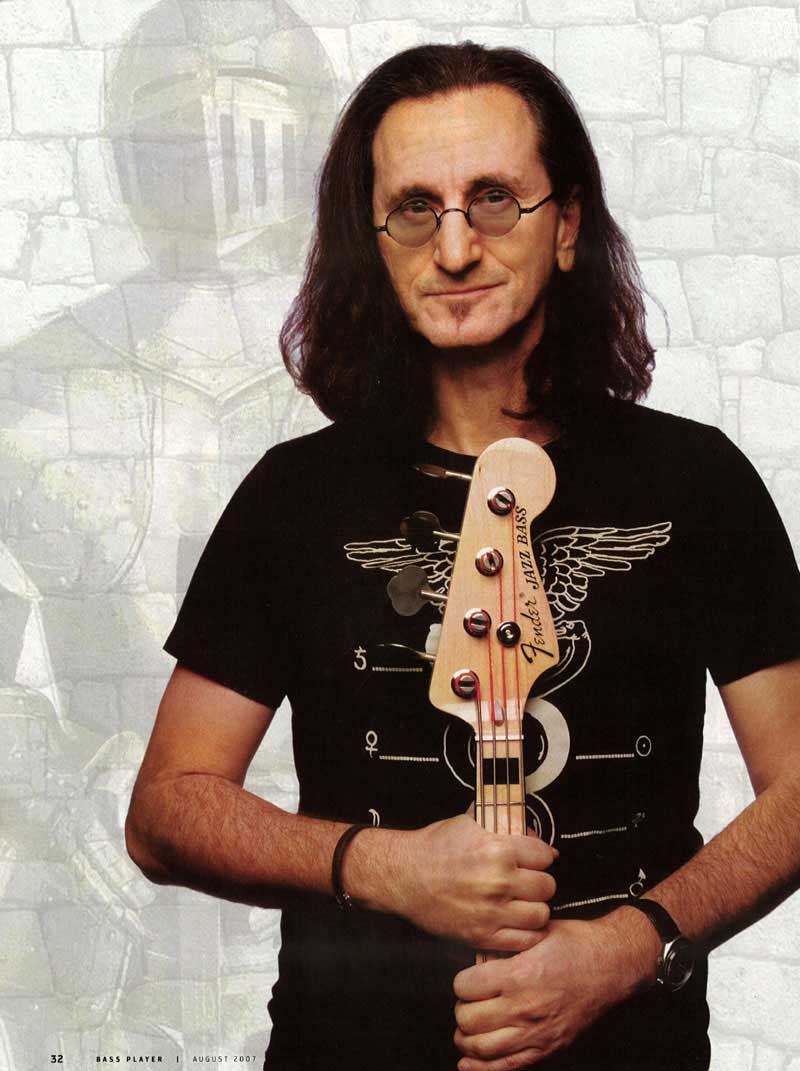
How do you and Alex typically write together?
Normally we just sit down and start playing. When I feel there is something connecting, I hit record. And as long as we're having fun and we're into something, I let it run. On a break I'll start listening through what we've done, isolating bits I think are worth developing. Alex will go sit in the back of the room and he'll start plinking away on the acoustic-or he'll have a nap [laughs]. If I have lyrics in front of me, I'll start singing a melody to make the parts meld, even if it's just one part of a song. If you isolate some of those sketch vocal tracks, you can hear Alex either snoring or playing acoustic in the background.
Alex and I have a great relationship-he knows I enjoy doing all the structural arrangement, so he lets me run with it. Then we'll make changes, such as replaying a crude idea in a more instinctive way.
Do you and Alex program your own drum beats?
Yeah, we have fun doing that. Alex follows his off-the-wall instincts for drum patterns-he has a reputation for being the world's wildest electric drummer [laughs]. Neil thinks Alex is a genius on drums, so he borrows some of those ideas to get going. When we finish a sketch we give it to Neil both with and without drums so he can work out his own ideas.
Do your parts change once it shifts to live drums?
They have to, because it feels very stiff when I'm playing bass with a drum machine. Often I cut-and-paste those original sketches and put together a new arrangement. When you use computers to write music-fitting everything nice and tight on that graph-it can be too mathematical and clean. That doesn't necessarily make for great songs. Once the real drums are there, I'll talk to Neil about his drum patterns and adjust things in my part. The end result has more of a realistic heartbeat, rather than a metronomic feel.
In Neil's online diary about making Snakes & Arrows, he says that he sees himself as more of a composer than an improviser. Where do you see yourself along those lines?
The two of us are similar-I guess that's rubbed off after all these years. I'm very much a beast of structure, while Alex is very spontaneous. We make a good team because of that. When there's a burst of creativity coming from Al, I'll run with it and try to mold it into something. That's not to say that he doesn't have good editing and arranging skills-he certainly does. But we have very different ways of looking at it. I'm much more linear then he is. He's a crazy Serb [laughs]. I think that's why we have been such good friends all these years.
Neil and I can read each other's minds rhythmically, which can be both good and bad. Having Nick produce this record broke us out of our structured obsession, as he would throw a lot of spontaneous ideas at us while we were laying down tracks.
To work with a drummer of Neil's ability was a great thrill for Nick. He wanted to make sure Neil didn't get too satisfied with his part too quickly. He'd say, "Neil, why don't you solo over this?" Neil would go, "What? Producers never ask me to solo-usually they tell me to stop!" In rehearsals, Neil was cursing some of those moments on the record when he'd gone wild and played more spontaneously. Usually he knows everything he's played on a record, but not this time. I think that's so healthy for Neil, and it was healthy for me as well as a bass player.
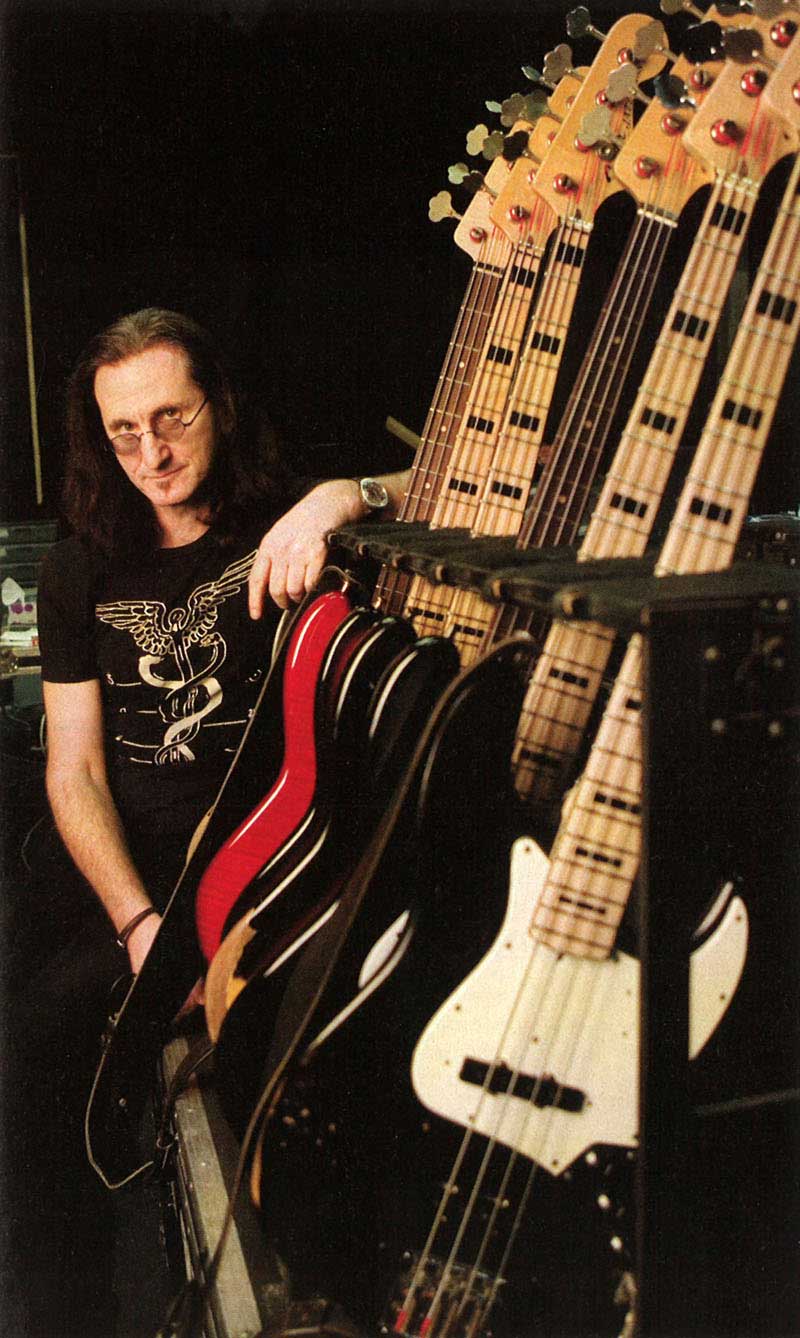
How did Nick push you?
He'd get me to think about utilizing my ability more rather than playing it safe. You don't usually think you're playing it safe when you write a part. That's why you need a producer-to make sure that you are pushing yourself and always playing your best.
Was "Malignant Narcissism" one of the songs born out of jamming?
Actually it was way more spontaneous. That song was the very last thing we did we on the record; we wrote it in the studio after we were pretty much done with everything. I was in the middle of doing vocal tracks when a friend visited and told me about Fender's Jaco Pastorius Tribute Bass. I checked it out online and thought it looked cool, so I asked Fender to send me one. I'd just plink on it in between vocal takes. It's a glorious bass to play-it just feels special.
I was jamming with it one day, and unbeknownst to me, Nick was recording the jam. At one point I was playing a little riff, and he came in and went, "Dude, that's a song-you've got to make a song out of that!" Neil happened to be there-we had finished his drums by then and torn down his regular kit, but we had left a little four-piece kit set up for us to jam on. We threw the song together with just bass and drums, playing live. Later, Alex came back and put his parts down. It took just a couple of days to throw together.
Have you played much fretless?
Not successfully. But I've discovered that when you play fast, people can't tell if you're in tune or not. When the notes pass quickly, you can get away with lousy intonation [laughs].
I asked Fender to make a fretted version of the Jaco Pastorius bass, so if I'm having trouble with intonation, I can always play that one. But that's a bit of a cop out. After all, I can't make a big deal out of playing fretless if I can't do it live-the shame will be too much for me to bear!
How did "The Main Monkey Business" come to be?
That was a pet project of mine. Once we had most of the material written, we did this big monster jam. We had a ton of great parts, and I spent four days trying to create the most self-indulgent piece I could think of. I changed parts when I felt like it, and I put it together in a really selfish way, not considering whether someone else would be able to understand it or not. I had a lot fun chopping up Alex's guitar parts.
How would you characterize your own bass playing?
I'm a fairly obnoxious bass player-I'm very intrusive. I don't think my playing style is very typical. But we are all our own worst critics, right? I was born into the Jack Bruce [Cream], Chris Squire [Yes], Jack Casady [Jefferson Airplane] world-those guys all pushed the melodic side of bass playing. That's how I viewed my role: not just to lay down the beat, but to add melody and some edge-especially in a three-piece-to fill up the sound. That's why I often let my open strings ring out; I try to be a bass player and guitar player at the same time. I guess my main strength is that I'm able to knit with Neil and smooth out some of the hyper rhythms that we do together. By playing more, it frees Alex melodically to do what he needs to do in the context of the trio.
What music are you listening to these days?
All I'm listening to is Rush, because I've got to spend so much time figuring out the parts. But I've also been listening to the new Arcade Fire record [Neon Bible, Merge/Rough Trade, 2007], which I'm really digging.
How do you think you've grown in the last few years as a bass player?
I'm a lot happier with my bass playing on this record than I was on Vapor Trails. For example, I think there is more range to the parts. They are more thoughtful and melodic. I didn't realize that until I went back to start rehearsing some of the Vapor Trails material for this tour. I realized the emphasis on Vapor Trails was rhythm, and that it had a rather narrow melodic scope compared to this record, which is all over the neck. I'm much stronger melodically, and I hadn't realized that until this rehearsal. I feel really good at the place I am as a player at the moment.
All That Jazz
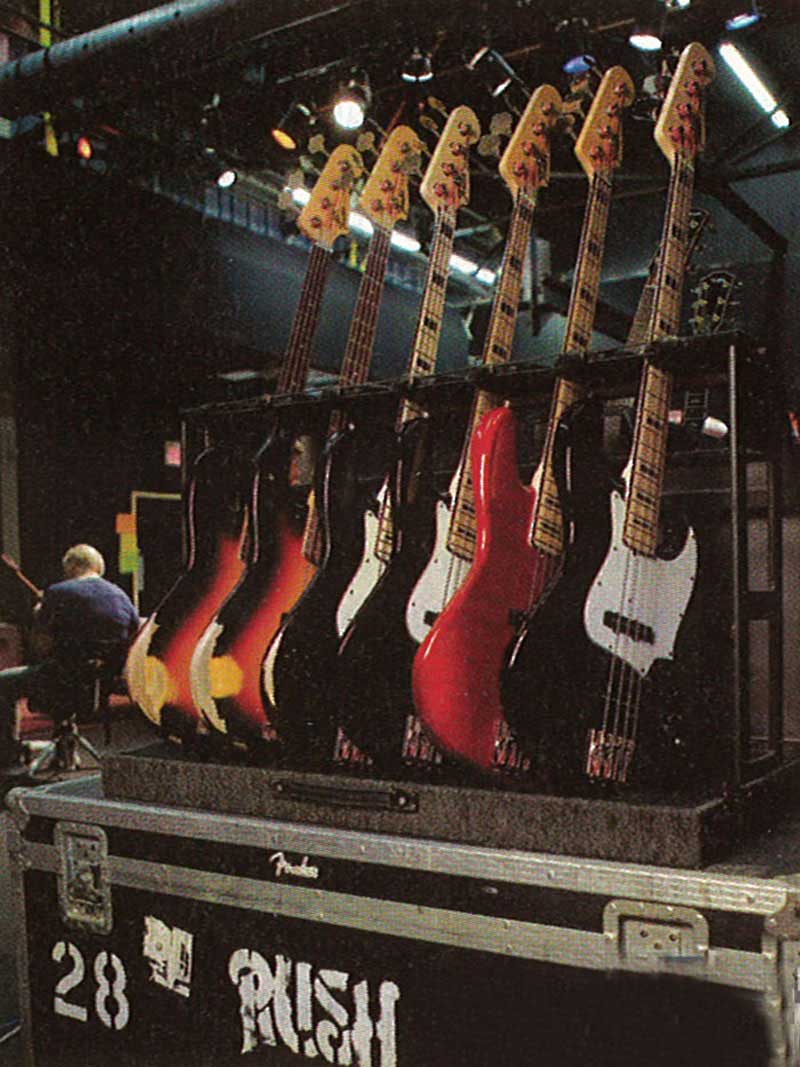
For most of the current tour, Geddy is playing his original '72 Jazz Bass, which he recently fitted with a new neck. "The original neck was pretty much shot," he explains. "We had adjusted the trussrod so many times that it was becoming problematic, and the frets had been re-dressed one too many times-it just couldn't take it anymore.
"We replaced the original neck with one from my signature bass. We sanded down the back to remove the lacquer and upgraded the tuning pegs, which we're going to do to on the next run of signature basses. Sanded necks make a huge difference. This new one feels much faster than my original, and I haven't noticed any difference in the sound. Now I'm sanding down all my necks."
Geddy will also be wielding a beautiful transparent-red Jazz Bass from the Fender Custom Shop. "It's a gorgeous instrument; next to my original Jazz Bass, it's my favorite to play. The top end is a little twangier, but the low end is really consistent and round. It doesn't sound like as big a beast as my original, which has a bit more of a gutsy grunt in the low-midrange. This is a little cleaner sounding, but it's a little deeper, as well."
Of course, a few fans will flip when they see Geddy rocking onstage with a fretless-one of Fender's Jaco Pastorius Tribute Jazz Basses. Geddy is also traveling with a fretted version of the Jaco tribute bass. "All that extra metal on the fingerboard makes it sound much brighter than the fretless," he says. "I hope to use that on a future record when I need a different sound." All basses take Rotosound roundwounds except the Pastorius models, which retain their stock Fender Super Bass 72S0ML strings.
Geddy has long preferred Leo Quan Badass bridges to stock Fender bridges. "I do hear a difference - I prefer the sustain you get with a Badass bridge. I put them on all my basses, but I'm not messing with this bass," he says of the Pastorius tribute. "This was Jaco's bass - his concept. I pay tribute to that, because he was unbelievable."
"Geddy's bass rig is very simple," adds bass tech Russ Ryan. Geddy sends his bass to the house via three channels: an Avalon U5 DI, a Tech 21 SansAmp RPM preamp, and a Palmer PDI-05 Speaker Simulator.
"Geddy uses the RPM for his dirtier, distorted sound," says Ryan. For years Lee had used the SansAmp RBI; he switched to the newer RPM model after auditioning it in his home studio. "The RPM's sound has a little more detail than the RBI, and the distortion is a little more controllable," says Geddy.
The most esoteric piece of gear in Geddy's rack is the Palmer Speaker Simulator. "These are older models, from the '90s," Russ points out. "They're very hard to find, because most musicians won't give them up." "The old Palmers have a really warm bottom-they add a nice low-end distortion," adds Geddy.
Nick Raskulinecz On Producing Snakes & Arrows
Ever wonder what it would be like to produce one of your all-time favorite bands? "Dude, it was amazing," enthuses Nick Raskulinecz, whose talent and energy galvanized sessions for Snakes & Arrows. "I'm kind of a 'muso' guy, so I totally got off on working with guys who could all play so damn well.
"It was absolutely inspiring to watch Geddy play," says Raskulinecz, who recently finished sessions for Coheed And Cambria's latest, No World for Tomorrow [Columbia/Equal Vision). "Nobody plays bass like that anymore. Geddy carefully plans all his parts, but the record captures a lot of his off-the-cuff playing. He'd pull off these riffs that were just amazing. Plus, Geddy actually plays bass lines-he doesn't just follow the roots."
Geddy cut his bass parts standing in the control room and listening through the monitors. "For some reason, his bass was buzzing like crazy, so we taped off the one area of the room where it was quiet and had him stand there," Nick says. "Geddy had a cool, buzzy growl on the older records, and I wanted to get that kind of vibe. I didn't want this record to sound like anything the band has ever done, though. They've never copied themselves, so I had to be careful. His bass sound is a combination of four things: a Martech MSS-01 DI, a SansAmp RBI, a Palmer Speaker Simulator, and an old Ampeg SVT. Really, the sound just comes from his fingers - his unique playing style."
Why did the guys in Rush go with a producer nearly half their age for the new record? "They were looking for somebody to push them into new territory," adds Nick. "That's one of the reasons they got me to produce the record. They had gotten tired of people telling how great they are all the time, and they looked to me to see if something was cool."
Raskulinecz was blown away by the band's precision and speed when it came to tracking. "Some days, we were recording two or three complete drum and bass tracks in the same session. Geddy's bass took just a couple hours per song. He's a pro. And even after all these years, his ear is still very finely tuned. I couldn't believe the details he was hearing. Geddy's a really smart, nice guy, but when he has that bass on, he is all business!"